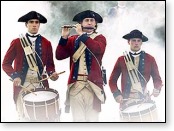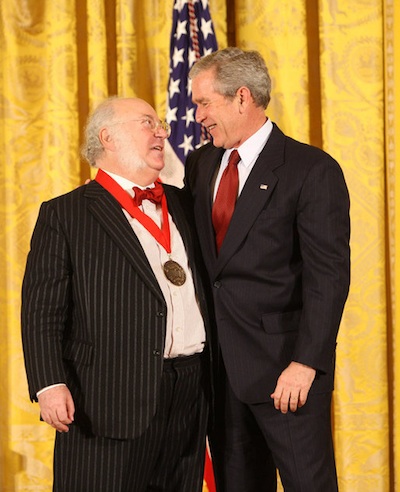Myron
Magnet and Alexander Hamilton at Hamilton Grange,
2013.
Photo © Kevin Daley, National Parks of New York
Harbor
Myron Magnet, prizewinning author of The Founders at Home: The Building of America, 1735-1817, was the editor of City Journal from 1994 through 2006 and is now the magazine’s editor-at-large. A former member of the board of editors of Fortune magazine, Magnet has written about a wide variety of topics, from American society and social policy, economics, and corporate management to intellectual history, literature, architecture, and the American Founding.
His earlier book,
The Dream and the Nightmare: The Sixties’ Legacy to
the Underclass (William Morrow, 1993; second
edition: Encounter Books, 2000) argues that the radical
transformation of elite and mainstream American culture
that took place in the 1960s produced catastrophic
changes in behavior at the bottom of society that gave
rise to the urban underclass. Hilton Kramer called the
book “an indispensable guide to the outstanding question
of the day,” while columnist Mona Charen deemed it “the
book of the decade.” President George W. Bush told the
Wall Street Journal that it was
the most important book he’d ever read after the
Bible, and Bush strategist Karl Rove called The
Dream and the Nightmare a roadmap to the
president’s compassionate conservatism.
Myron Magnet receives the National Humanities Medal from President George W. Bush, November 2008 President George W. Bush
Dr. Magnet is also the author of Dickens and the Social Order (University of Pennsylvania Press, 1985; second edition: ISI Books, 2004) and editor of The Millennial City: A New Urban Paradigm for 21st-Century America; What Makes Charity Work? A Century of Public and Private Philanthropy; Modern Sex: Liberation and its Discontents; and The Immigration Solution: A Better Plan than Today’s.
In addition to his many City Journal and Fortune articles, he has written for The Wall Street Journal, National Review, The American Spectator, Commentary, The New York Times, and other publications. He has also appeared on numerous television and radio programs.
Magnet holds bachelor’s degrees from Columbia University (1966) and the University of Cambridge. He earned an M.A. from Cambridge and a Ph.D. from Columbia, where he taught for several years, before joining the staff of Fortune in 1980. President Bush awarded him the National Humanities Medal in 2008.
Married, with two grown children, Magnet lives in Manhattan.

NOW....
excerpts from the New Your Post
Founding
Fathers’ Warnings Powerful Reminder
Amid Government Crisis
By Michael Goodwin
October 12, 2013
In his masterful new book on early America, author Myron Magnet uses concise biographies of George Washington and other Founders to illustrate why our revolution unleashed more than two centuries of freedom and prosperity.
“The Founders at Home” is a work of scholarship and a labor of love, and offers vivid reminders of the courage of extraordinary individuals who birthed a new idea on Earth.
Take, for instance, the
back-stabbing rivals trying to oust
Washington as head of the
Continental Army. Even as soldiers
were leaving bloody footprints in
the snow at Valley Forge, their
commander had to defend himself
against a vicious campaign by
supposed comrades. Imagine if they
had succeeded.
Or consider the unsentimental wisdom of John Jay, the diplomat who negotiated the treaty for independence with Great Britain and later became the first chief justice. Jay warned against the false “nostrums and prescriptions” of the ambitious and greedy, and urged his countrymen to “take men and things as they are.” Otherwise, he wrote, “the knaves and fools in this world are forever in alliance,” and self-government was doomed.
Magnet’s warts-and-all tour is so
seductive in part because of our
current troubles. Despite the
success of the Founders’ grand
experiment, events in Washington and
around the world have many Americans
fearing we are headed for a
crack-up.
The fear provokes a wish we had a
Washington or a Jefferson to guide
us now. But the genius of Magnet’s
book is that the “home” in the title
refers not only to the actual homes
the Founders built, many of which
still stand, but also to the
profound personal responsibility
they felt to their new nation.
At enormous risk and cost, they
created a model of patriotism that
is not reserved for great men with
lofty responsibilities. Their
examples still matter because
American exceptionalism ultimately
is about ordinary people doing
extraordinary things.
It is not enough to complain about
our leaders and declare a pox on
both their houses. We the people, are
sovereign and get the government we
deserve. If bums are running the
country, look in the mirror.
This does not mean that political
strife is the problem. In fact, the
system of checks and balances is
based on the Founders’ assumption
that human nature would be guided by
self-interest, and that the clash of
interests would produce a result
that fairly represents the will of
the people and the common good of
the country. But, obviously,
something is broken. The balance
between rights and responsibilities
has been shattered and the nation’s
character diminished.
The same sense of self-gratification
and entitlement that infects our
culture rules our politics. Elements
of our government are as vulgar as
the worst of our entertainment. As
Magnet shows, the Founders predicted
the peril we now face. Washington
saw the Constitution as but a piece
of parchment that depended upon
“virtue in the body of the people.”
If that virtue was eroded, he
warned, by a “corruption of morals,
profligacy of manners and
listlessness for the preservation of
the natural and unalienable rights
of mankind,” America would
degenerate into tyranny.
No, we are not there yet, but ask
yourself this: Where on the spectrum
of our history are we?
Are the founding virtues still
intact, or has their spirit been
eroded by the “corruption of
morals”?
Are we closer today to the ideals of
liberty, or to the tyranny the
Founders warned would follow the
death of those ideals?
Each of us should answer those questions and act accordingly.
After all, accepting individual responsibility is the foundation of American exceptionalism.
Thank you, Michael Goodwin
October 12, 2013

Pathways
America- The Rule of Law...Prophecy and Historical Documents
Lois Crawford
2015

All LJC text
Copyright © 'Beliefs'
1993-2015

